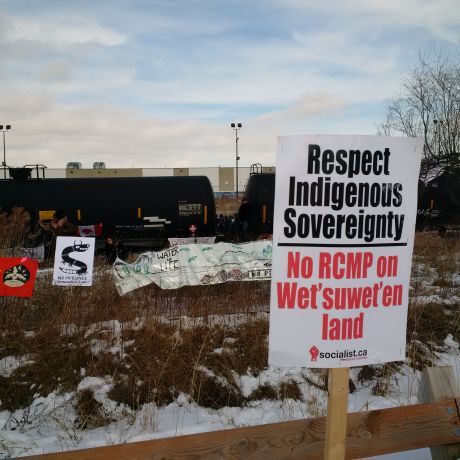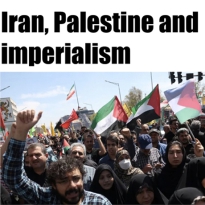Reports
You are here
Indigenous sovereignty, pandemic and the Wet'suwet'en struggle

May 6, 2020
At the beginning of March, immediately following the end of the talks between Liberal government ministers and the Wet’suwet’en Hereditary Chiefs, CGL began preparing for continuing the construction of the fracked gas pipeline over unceded Wet’suwet’en land.
Indeed, the RCMP and CGL never left the territory since they occupied it in early February. Rallies, marches and rail, port and road blockades by Indigenous land defenders and settler allies across so-called Canada in January and February interrupted the pipeline dreams of the 1% and forced the federal government to negotiate.
But there is a disjuncture between recognizing Wet’suwet’en territorial rights while allowing RCMP and CGL free rein of those territories. Similar to the Reconciliation process, rhetorical flourishes recognizing Wet’suwet’en legal title mask the same colonial policies that have operated for more than 150 years.
The disastrous COVID-19 pandemic has put a damper on the protests that shook government and industry earlier this year.
Eve Saint, one of the Wet’suwet’en land defenders who was arrested at Gidimt’en checkpoint during the RCMP invasion on February 7 put it this way:
“The year 2020 has certainly been historic for some already with the Wet’suwet’en Hereditary Chiefs evicting CGL, living on the land the way we are meant to be, RCMP raid, Shut down Canada and now a Pandemic that has actually shut down the world, it’s definitely a peculiar time. But not a time to let this stop our progress in fighting climate change and standing for Indigenous rights.”
And the pandemic is dangerous for Indigenous people not just because it has paused the historic Wet’suwet’en Solidarity movement but also because First Nations communities and Indigenous people remain among the most vulnerable to the ravages of such infections. Lack of access to clean water or adequate medical facilities and supplies on many reserves mean they will struggle to follow public health guidelines regarding hand-washing, the wearing of masks, not to mention isolation and quarantine facilities and ventilators. Indigenous people off reserve face grave challenges as they are more likely to live in poverty, lack access to healthy food and decent housing or be incarcerated.
Saint described these challenges and what settlers can do to help Indigenous people and communities at this crucial time.
“We definitely need more help with resources making sure people can pay their rent, Indigenous people have been removed from their homes and land since colonization and we see a lot of displacement and homelessness in our Indigenous communities especially since Canada is stolen land we still see the impact til this day, it would be a great way to help Indigenous people who may face losing their homes it’s hard enough to find an affordable apartment in Toronto.
There are families that may not have the means to get the food and supplies they need especially with jobs shutting down or be at more health risk going into public spaces if there can be some mobilization support especially for our elders in our community the ones who carry on our traditions, ceremonies, and culture. We need to keep our elders safe.
It’s always a must to check in with the Indigenous organizers they see what needs to be done in their community or what resources they are in need of.”
Highlighting these concerns, many First Nations communities have restricted access to their communities: on Haida G’wai territory, where boats and planes are being turned away from the islands; on Six Nations territory, they are restricting access to limit overcrowding of visitors “due to the large amount of non-residents entering the territory to buy cigarettes and gas.”; Atikameksheng (Whitefish Lake) and Wahnapitae Anishnawbek First Nations are restricting access; on Naotkamegwanning First Nation, in a remote location is shutting down access by air, the only way to access their community.
The challenge for the Wet’suwet’en people is that their ability to protect their own unceded territory has been impeded by the presence of RCMP arresting and harassing them and escorting CGL workers onto the territory to continue building the pipeline. And not only has construction on BC megaprojects continued, the industry has continued to flood BC First Nations with resource extraction proposals - 30 in the Skeetchestn First Nation alone. If a proposals is not responded to within 30 days, consultation rights for First Nations could be denied.
Non-essential business is supposed to be shut down to protect public health by slowing the spread of this novel virus, and yet the CGL man camps are filling up with workers from all over the province and beyond. This is the modern equivalent of the smallpox infected HBC blankets that were used to exterminate Indigenous people in the past, with the man camps acting as incubators for this disease that none have immunity to. As Eve Saint explains:
“This is definitely enraging to me when I found out that CGL is continuing their work in Wet’suwet’en territories and all these outside workers coming from all over, coming into Wet’suwet’en territories putting our people at risk, our elders. I am currently in Houston in so called British Columbia right around the corner from the motel where these workers are staying and it’s very disturbing. Our grocery stores and public places are at higher risk now of catching the virus. Again we are seeing Indigenous Genocide and the Canadian government with no regard for Indigenous life. Industry and the Government is using this pandemic holding us hostage to their advantage its disgusting and absurd.”
For many in the movement for climate justice, it has been clear for some time that business as usual cannot continue if we hope to tackle this existential challenge. The prioritization of oil and gas infrastructure by the Canadian and BC governments in a moment when the world scientific consensus tells us we have to keep the carbon in the ground, shows the shortsightedness of an economic system that puts profits for the elites ahead of people or a sustainable environment. The Liberals have been contorting themselves to present the image that they are acting for the climate while they buy pipelines and double-down on tar sands development, arguing that they can’t make drastic changes all at once.
Governments who tell us they are on the job have all been cutting public health and healthcare budgets for generations, leaving us vulnerable for such a crisis. While Indigenous communities remain the most vulnerable for these criteria, people’s ability to access social assistance and other services has been severely curtailed and real wages and working conditions have been driven down through decimation of good union jobs and the rise of the gig economy. Even as governments call for people to stay home, workers have had to stand up for their own rights to shut workplaces down. Those in essential jobs, such as healthcare workers and transit workers, have been forced to stand up for their rights to personal protective equipment (PPE) which have been in inadequate supply for the scale of the crisis.
Governments have shown their ability to fund drastic changes in a short timeframe, and people have modified their behaviour putting the lie to arguments against drastic changes to halt the climate crisis. But the solutions on offer from government in the middle of this crisis, where they bail out industry and let workers lose their jobs, or where pipelines are allowed to go through Wet’suwet’en land over the objections of Indigenous people across the country, it will simply pave the way for future economic and health crises. We need system change to build a world where food production isn’t beholden to the interests of global corporations, but is subordinated to human need and sustainability. We need energy production that sustainably fulfills human needs, instead of meeting the profit requirements of the vested interests. Many Indigenous people, see that capitalism needs to be resisted and Indigenous communities need to act together to ensure traditional land rights. Saint is clear on what this smeans for the future:
“We are already witnessing the world cannot be sustained through industry and capitalism. We are too dependent on others that have no regard for our lives to provide us with clean drinking water, food, warmth and housing. The government already lacks immensely in these areas for Indigenous people and industry continues to destroy our lands, water, and communities. I really hope we can learn from this and move into more sustainable living, food security and protect our clean water. Let’s take some more power back and put it in the hands of our people, for our health and well-being.”
For socialists this points to a potential alliance between the working class and Indigenous revolutionaries, who both have an objective interest in the demise of the capitalist system of exploitation. For those in the working class it’s important to champion Indigenous rights to free, prior and informed consent to projects on their own unceded territories. In addition, there are many Indigenous people who are workers, and working class revolutionaries must be the tribune of the oppressed, fighting for solidarity from the whole working class for those most marginalized by the system.
We can fight for a different world, to end the exploitation of labour at the point of production through workers’ collective seizing control of their workplaces, for Indigenous Self-Determination on the stolen lands of Turtle Island and for the adoption of Indigenous principles of sustainability for the whole of society.
Section:










